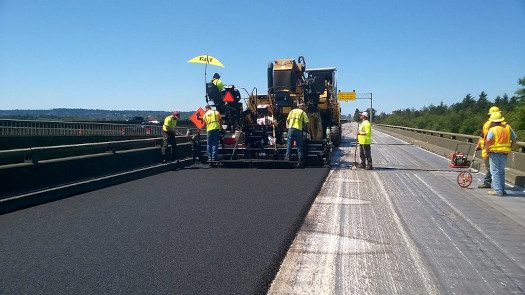
Governor Hochul Announces Start of $18.4 Million Pavement Improvement Project on NYS Thruway in Rockland County
Governor Kathy Hochul announced the start of an $18.4 million pavement improvement project on the New York State Thruway (I-87) in Rockland County. The work will cover more than 30 lane miles on a more than five-mile stretch between north of exit 14A (New Jersey – Garden State Parkway) to south of exit 15 (New Jersey – I-287 – NJ Route 17 South) in the town of Ramapo. Approximately 116,000 vehicles travel this corridor each day.
“New York State continues to invest into its transportation system by creating safe, reliable roadways that are used by New Yorkers and visitors alike,” Governor Hochul said. “Reliable transportation networks enhance daily commutes and boost local economies through the efficient movement of goods and services. By prioritizing these investments, New York State is paving the way to smoother, safer, and more sustainable travel for drivers on the Thruway.”
As part of the Thruway Authority’s Capital Program, approximately $377.4 million is being invested in infrastructure projects in the Hudson Valley from 2024 to 2028. The Rockland County project will begin with full-depth pavement repairs, meaning crews will remove and replace the most deteriorated portions on the roadway (from milepost 24.0 to 29.4), down to its subbase in both the northbound and southbound direction. Covering more than 30 total lane miles, the repairs will improve the existing roadway’s structural integrity. Crews will also address less stressed areas of the roadway by removing the existing asphalt overlay and installing a two-inch asphalt overlay for an improved riding experience, including on the ramps to and from exit 14B (Airmont – Montebello – Airmont Road).
Safety improvements will include new guiderail, bridge joint work, drainage improvements, reflective line striping and replacing lane delineators. Paving operations will take place overnight on weekdays to reduce impacts however, motorists may still encounter lane closures on the highway along with traffic shifts and stoppages while construction is underway. All work is weather dependent and subject to change.
JRCRUZ Corp. is the project contractor following a competitive bidding process and the work is scheduled to be completed by the end of the year.
The Authority’s 2024 Budget invests a total of $451 million to support its Capital Program, which is expected to invest $2.4 billion into capital projects over the next five years—a $500 million increase following the toll adjustment enacted in January 2024. The increased investment will lead to work on approximately half of the Thruway’s more than 2,800 lane miles as well as projects on approximately 90 of Thruway’s 817 bridges.
Approximately 85 percent of the Thruway’s roadway base dates back to its original construction in the 1950s, highlighting the need for heavy maintenance, reconstruction, and rehabilitation activities to keep the riding surface in a state of good repair.
In 2023, motorists took more than 396.9 million trips and drove 8.1 billion miles on the Thruway, a user-fee supported roadway that receives no dedicated federal, state, or local tax dollars to cover the costs of operating and maintaining the superhighway. Motorists are urged to be alert and follow the posted work zone speed limits. Fines are doubled for speeding a work zone.
To further enhance safety for workers in a work zone, Governor Hochul signed legislation establishing the Automated Work Zone Speed Enforcement pilot program. The safety enforcement program began in April 2023 and is in effect in various active construction zones on the Thruway. Work zones with speed camera enforcement will have clear signage leading up to the work zone. Motorists violating the posted speed limit within the work zone will be fined. Violation fines will be issued to the vehicle’s registered owner by mail.
The Authority operates and maintains one of the safest, low-cost superhighways in the nation. The 570-mile Thruway system is funded by toll dollars, not state or local taxes.









